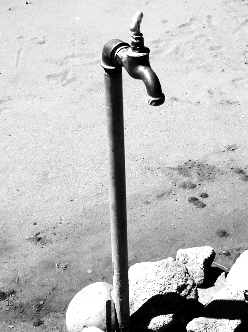Health minister denies supplies
 A 10,000-megalitre water allocation for irrigation in the NT has been revoked.
A 10,000-megalitre water allocation for irrigation in the NT has been revoked.
The allocation was for an agricultural development project at Larrimah, about 180 kilometres south of Katherine.
The allocation was revoked by the Territory's Health Minister, who had to make the decision because the Water Security Minister had a conflict of interest.
The farming precinct was described in advertising literature as having “a unique seasonal advantage for crops such as mangoes, citrus, and melons”, having attracted interest from “several parties”.
But the plans attracted the interest of the Northern Land Council (NLC) and the Environment Centre NT, which made submissions to the Northern Territory government about the 10,000-megalitre water allocation.
This triggered an independent review in which the Environment and Water Security Minister, Eva Lawler, “declared a conflict of interest due to her oversight of the NT Land Corporation”.
This left the final decision with the Health Minister, who decided to cancel the water licence.
“Therefore, I acted as a delegate and made a decision based on advice I received,” Ms Fyles said.
“In this transitional zone, [where the Larrimah project is located] the advice I have been given is that the appropriate approach likely needs to be determined on the basis of the specific aquifer characteristics, and these criteria need to be more explicitly defined in guidance material to support the Water Allocation Planning Framework.”
Paul Burke, chief executive of the NT Farmers Association, said the decision came from “an unfortunate chain of events”.
“The scientific data doesn't support [the water licence being cancelled], but that's the decision that's been made, and we need to work through how to ensure it doesn't happen again in the future,” he told the ABC.
“This land doesn't have a lot of potential without water.”
NLC chief Marion Scrymgour said Ms Fyles made the right choice.
“Clearly the original decision made by the Acting Water Controller was incorrect,” she said.
“We have dodged a bullet that could have had detrimental impacts for generations to come.
“We had concerns the decision was not based on the best available scientific information and that it would be unsustainable in the long-term – creating risks to all Territorians.”








 Print
Print